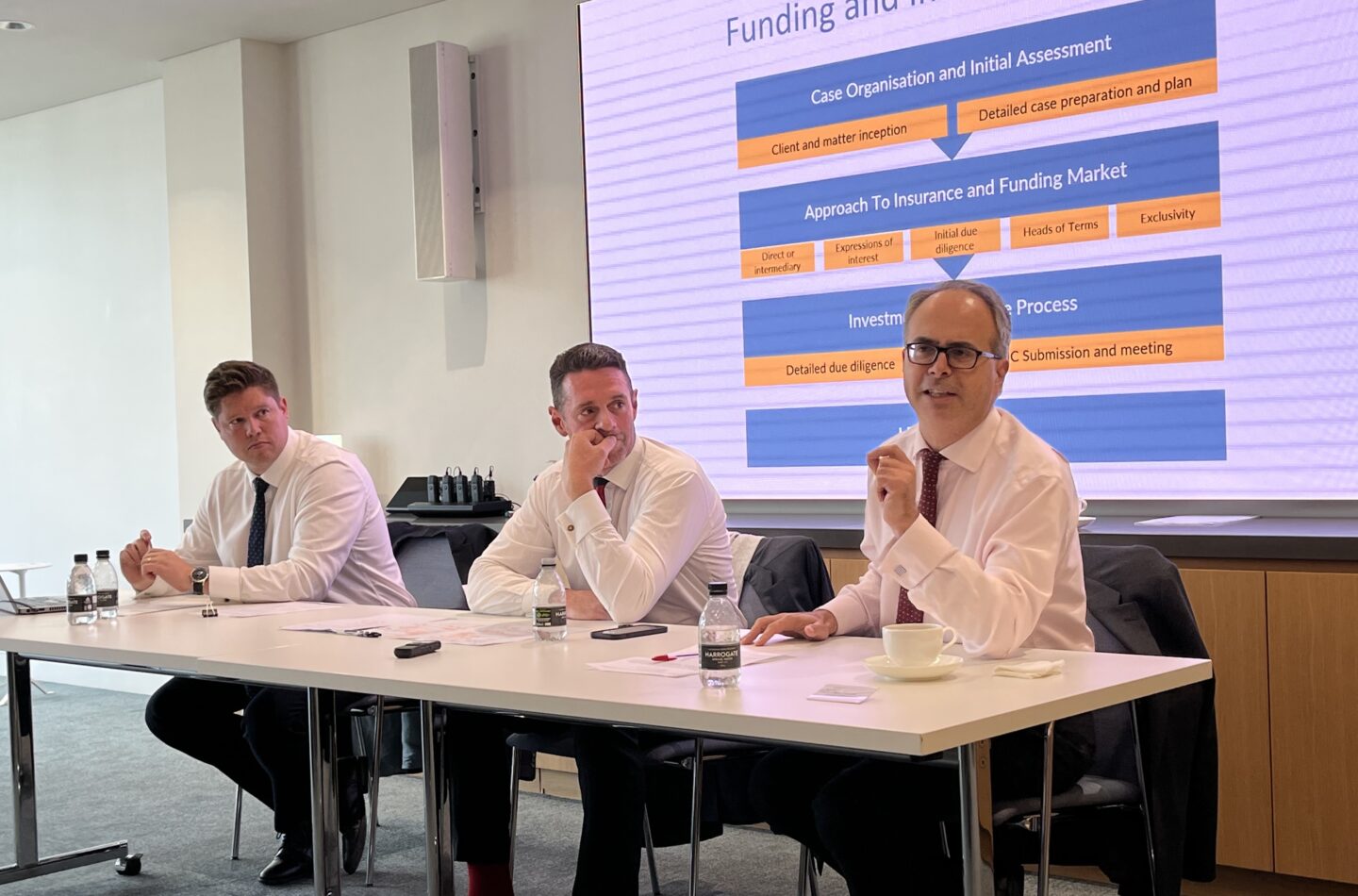Harbour Underwriting’s managing director and underwriting director Rocco Pirozzolo was recently on a panel with Locke Capital’s managing director Nick Pontt and Miller Insurance’s Head of After the Event (ATE) insurance James Gowen-Smith, discussing ‘The litigation funding and ATE insurance lifecycle: A roadmap to success for lawyers and clients’. The event took place at Miller Insurance’s London office before an audience of leading litigation lawyers
Commercialities of the case
Nick Pontt said a key point from a litigation funder’s point of view is understanding the commerciality of the case and the client and law firm’s appetite for risk: “Will the economics work for the funder, the client and the firm?”
Nick said that a litigation funder focuses on whether it will get its money back, how much it will get back and when. “Most cases we don’t fund is rarely due to merits these days,” he said. “When we say no, it is usually to do with enforcement, duration and an alignment between budget and quantum.”
Picking up on this last point, James said: “Proportionality is the key word: the cost to quantum ratio. It is normally on the smaller cases you see the difficulties.” James said this is where a broker can help as they can assess which funder is right for each case. The same applies in relation to insurance.
The panel was asked by an audience member whether there was a figure below which it is not worth trying to get litigation funding. The panel said there were no hard and fast rules; the budget to quantum ration depends on the funder as they all have different mandates and priorities.
Appetite for risk
Rocco Pirozzolo said a key point in any case is the client’s appetite for risk. “Lawyers have a professional obligation to talk about funding and dispute insurance, but I question the extent to which they feel comfortable talking about risk. I struggle when a lawyer says their client doesn’t need litigation insurance or funding. They may be right, but have they really spoken to the client about it, or are they making an assumption?” Rocco said this is where bringing in a broker like James is useful.
A myth about funding and insurance Rocco was keen to highlight was that they are only relevant to clients who are impecunious. “This is not true as many clients have the money but are happier using someone else’s as it’s an efficient way to run their business,” he said. It is also not true that insurers won’t cover a case unless the lawyers have skin in the game. Rocco said this does give him comfort, but “I will still look at the case; I either like it or I don’t like it”.
Preparation and planning
Nick said a critical part of the funding process from a lawyer’s point of view is knowing about the funder and asking the right questions, such as the funder’s liquidity, the source of their funds, whether it is necessary to report to an investment committee and what the process is. Also, when a funder confirms interest, what does this mean, and when they give terms, what does that mean? These sound like simple things, but every funder is different and asking questions and getting answers is key.
Rocco said this all comes back to preparation and how it is important to understand what litigation funders and insurers are looking for. He said when he worked previously as a litigation funder, his mindset was the reverse of how it is now as a dispute insurance underwriter. As a funder, he would look at enforcement first, then the budget to the likely recovery (rather than the amount of the claim) and duration. Then you would get to the merits. As an underwriter, he said he starts with the merits, so it is more like a lawyer thinks traditionally, but he would look at the other aspects later.
An audience member asked if it is better to go to an underwriter first before approaching a funder. Rocco said he was “agnostic about it” and wouldn’t turn a risk away because funding was needed. James agreed with Rocco that it is common for funders and insurers to be approached at the same time.
Lawyers’ relationships with funders and insurers
A lawyer in the audience questioned if there is a tension for lawyers if they build relationships with one or two funders only. For example, if a lawyer refers a client only to one or two funders they have a relationship with, is there a risk a client will say the lawyer should have looked at a broader market?
James picked up on this and said: “Having a relationship with a funder or two doesn’t mean every case has to go to them (and the same applies to insurers). As a broker, I know different funders’ nuanced appetites and access to capital, so let me take on that role for you and work on behalf of the client. As lawyers, you’ve got better things to do, especially if your time is unbillable.”


